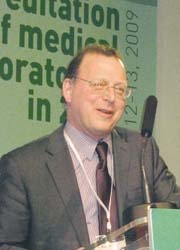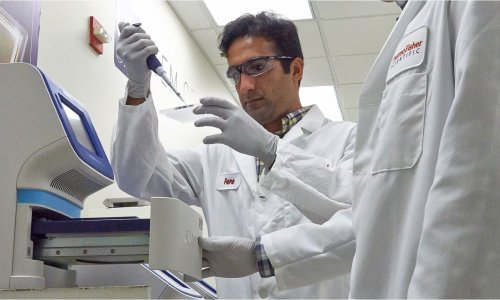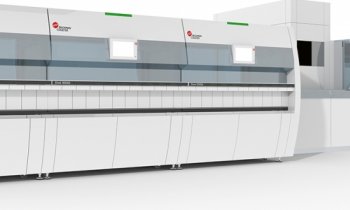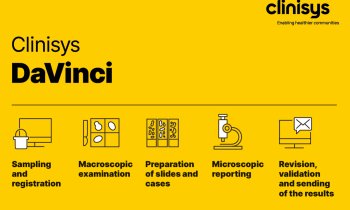Event
The 1st European Symposium on Quality Management and Accreditation in Laboratory Medicine
12 February 2009 in Paris, France
Organised jointly by the International Federation of Clinical Chemistry and Laboratory Medicine (IFCC), the European Federation of Clinical Chemistry and Laboratory Medicine (EFCC) and the French Society of Clinical Biology (SFBC), the two-day symposium served as a platform to address future strategies to promote accreditation for clinical chemists and all professions in laboratory medicine.

There was a special focus on the accreditation of medical laboratories in the context of the current French reform to standardise both private and public laboratories. The meeting was supported by the French Hospital Federation and Bio–Rad Laboratories.
There is renewed interest in Europe, and this year in France in particular, in the importance of accreditation for medical laboratories. The role of the medical laboratory has changed over the years in parallel with the evolution of healthcare facilities. Today, medical laboratories have an important place in improving the standard of care that patients receive from preclinical monitoring, diagnosis to treatment assessment and monitoring. As such, it is of the outmost importance that the quality of the work is standardised, hence the interest in accreditation, which not only serves to provide harmonised care throughout the healthcare community but also can help to improve the work flow of the individual laboratories.
After a lengthy, but incredibly clear session on the history, background and implementation of ISO 15189 from David Burnett, individual countries gave reports on how accreditation has or is being implemented by them in both the public and private sector. The whole conference was on live web link to Croatia and Hungary, so that all discussions had a real pan-European relevance.
Jane McDougall of European Hospital asked Mike Hallworth, Consultant Clinical Scientist to the Shrewsbury and Telford Hospital NHS Trust, UK and President of the EFCC about the development of the symposium and critical issues affecting laboratories today.
What is the major drive behind the meeting?
MH: This is the first European meeting organised purely on the subject of accreditation but the EFCC has a long history of supporting accreditation — we’ve been providing materials to help accreditation since 1993. This year, with changes in regulations in France, it seemed like an ideal time to bring together all our European experience so that in over-viewing the collective understanding we could provide positive examples to help the French in this new regulatory environment.
Why is laboratory accreditation important?
One can see that accreditation serves a dual purpose. It’s in the interests of patients, of society and of governments that clinical laboratories, wherever they are, operate to the same high standards of professional and technical competence. Likewise it is in the interests of competent laboratories to have their aptitude verified by a process of inspection and confirmed by comparison with an appropriate standard.
What is the standard chosen for accreditation?
The IFCC recognises ISO 15189 as the standard of choice. This standard encompasses all the necessary assessment criteria specified in the IFCC/EFCC policy statement and therefore it should form the basis of accreditation for all medical laboratories.
How does a laboratory become accredited?
If a laboratory wants to become accredited it should select an appropriate accrediting body, operating to appropriate international standards (ISO 17011) and also, which is very important, takes into account the particular requirements of medical laboratories. In reality there is little choice of accrediting bodies, but National Accrediting Bodies (NAB’s) in Europe do operate to the correct standards and do have to take into account the special requirements of medical laboratories.
Are all European countries at the same level of accreditation?
The levels of accreditation vary enormously. Some countries have a strong tradition of accreditation, while others have come to the process later. Our aim now is to harmonise the procedure throughout Europe and, since the introduction of the ISO 15189 in 2003, this has become much easier.
France has such a good healthcare system, so why is it one of the less strong countries?
I think it’s a question of the difference in the market. While the UK, for example, had fewer publically funded laboratories under a central management system, France has many more, much smaller private laboratories so the overheads and organisation to harmonise activities has previously been seen as too complex.
Does the EFCC have other meetings organised, or plans for the coming months?
Well, we have the EuroMed Lab meeting every two years. But, in addition to this, we are planning a series of themed meetings in conjunction with the European Medical Doctors Organisation, starting in Lisbon which will cover the clinical aspects of laboratory medicine.
We of course also have our vision of advancing clinical laboratory medicine across Europe and expanding the membership of the EFCC. Today we have 34 member countries, and soon Kosovo will be joining us. I hope this meeting will remind and encourage all our members about the value of our goal of harmonisation and cooperation between countries
01.03.2009










